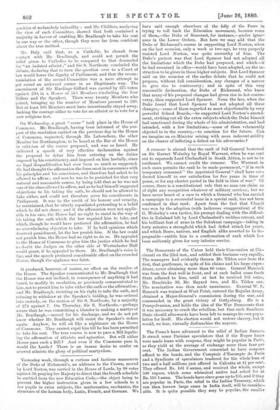On Wednesday, a great " scene " took place in
the House of Commons. Mr. Bradlaugh, having been informed of the pur- port of the resolution carried on the previous day in the House of Commons, requested, through Mr. Labouchere, the other Member for Northampton, to be heard at the Bar of the House in criticism of the course proposed, and was so heard. He delivered a speech of very effective declamation against the proposal to debar him from entering on the duties imposed by his constituency, and imposed on him lawfully, since no legal disqualification had ever been so much as suggested. He had thought the affirmation the form most in consonance with his principles and his conscience, and therefore had asked to be allowed to affirm ; and now he was to be punished for that very natural and reasonable course, by being told that as he was not one of the class allowed to affirm, and as he had himself suggested objections to his taking the oath, he should not be allowed to take either, and could not therefore serve his constituents in Parliament. It was to the credit of his honour and veracity, he maintained, that he utterly repudiated pretending to a belief which he did not share ; and if the affirmation were not applic- able in his case, the House had no right to stand in the way of his taking the oath which the law required him to take, and which, though he would have preferred the affirmation, he had no overwhelming objection to take. If he held opinions which deserved punishment, let the law punish him. If the law could not punish him, the House had no right to do so. He appealed to the House of Commons to give him the justice which he had no doubt the Judges on the other side of Westminster Hall would grant, if ho appealed to them. Mr. Bradlaugh's voice is fine, and the speech produced considerable effect on the crowded House, though the applause was faint.


































 Previous page
Previous page